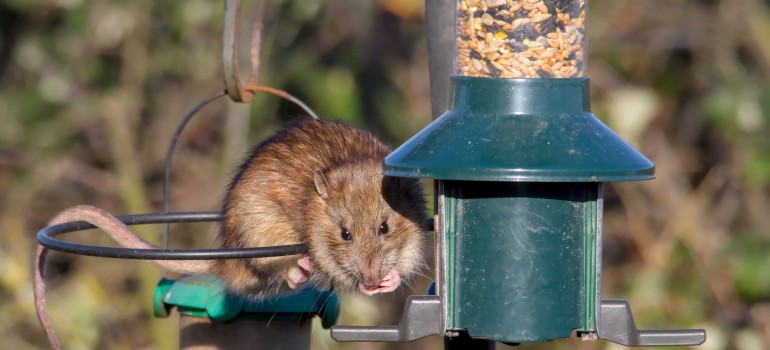
With the growing popularity of bird feeding, people are now faced with an “interesting” problem – rats. The nasty rodents are attracted easily by the seeds people use to feed birds, turning themselves into unwanted house guests.
So, how does one protect their property from hungry intruders?
Let’s find out. In this article, we will talk about the ins and outs of keeping your property rat-free and enjoying your bird-feeding hobby at the same time.
Table of Contents
Do bird feeders attract rats?
Those who have dealt with birdseed catchers or other types of feeders know the answer to this question. But let us say it for the rest of the enthusiasts who want to start feeding the birds in their yards – yes, bird feeders do attract rodents.
Rodents are always looking for food, so can we blame them for trying to steal some bird seeds? It’s in their nature to constantly be on the lookout for food, so it’s safe to say that mice and rats will most likely eat anything they get their tiny hands on. With that in mind, we all know that rodents usually carry lots of diseases, including Salmonella, that can endanger both other people and the birds you are trying to feed.
And while mice and rats are famous for actively hunting for food people leave for birds, it’s not 100% guaranteed that the rodents will occupy your garden if you place bird feeders there.
You may not have any bird feeders and still have a stubborn rat lurking somewhere in your back garden – one can never be sure of the number of unwanted guests hiding in their green space. With that in mind, we have some tricks up our sleeves to help you reduce long-tailed visitors, so continue reading.
Check also: How to Get Rid of Rats in the Garden Without Poison
How to stop rats from eating bird food
Now that we’ve all accepted the hard truth let’s finally get to the point – how to feed birds without attracting rats. Here are some measures you can take to keep rats and mice away from your bird feeders.
Install rodent-proof bird feeders
We are starting with the safe and very easy-to-purchase option – rat-proof bird feeders. That’s right, the quality of your bird feeder plays an important role in whether rodents will get to steal the birds’ food or not.
When choosing a bird feeder for your garden, make sure the one you purchase can be installed out of rodents’ reach. If possible, go for a hanging bird feeder. Pick a sturdy one that won’t be knocked off easily by the weight of the birds.
Why is this important? If seeds from your bird feeder fall on the ground, it’s only natural for rats to find them and stay in the area looking for more. To further proof your bird feeding pole, you can invest in a birdseed catcher or install a tray.
Remove water sources
The next thing you can do to discourage rodents from getting in your garden is to remove water sources. Mice, for instance, can go a month or even more without consuming water. However, this is not the case for rats. They need water to survive so that they may enter your garden in search of it.
It’s difficult to remove all water sources from your garden, especially when it comes to ponds or pools. However, you can at least empty birdbaths at night and fix any leaks to discourage the nasty rodents.
Check also: Who Is Responsible for Rats in Drains?
Store bird seeds properly
Rats and mice are notorious for their scavenging skills. So the next thing we advise you to do is be extra careful with how you store the seeds of your feathered friends.
Galvanised metal bins with a secure lid could be what you are looking for. Rodents like to chew holes through different textures and materials, even wood, rubber, and low-grade concrete, and while it’s not impossible for them to penetrate metal containers, the task will become harder. Keep the bins in a shed, and do not place them in your home to avoid inviting rodents there.
Check also: How to Get Rid of Rats in the Attic
Keep your yard and feeding areas clean
Birds can be fussy eaters. They are often looking through the seeds to find the bits they like best and flick aside anything else. Needless to say, seeds on the ground are not a good idea if you are trying to avoid rodents. We advise you to clean your garden and feeding areas regularly. Sweep up the discarded seeds as often as possible, at least once per day (preferably before night falls). Be sure to clean your deck as well, as rats under the decking are a common problem.
Add a baffle to your bird table
Rats on bird feeders are not a pretty sight. The nasty pests can easily climb up trees and land in your birdseed catchers. That means that if you have a bird table, the rodents will be able to get to the food. So, your best option is to install a baffle on your bird table.
Baffles will prevent not only mice and rats but also squirrels from getting anywhere near the birds’ food. It’s a cone-shaped piece of plastic or metal that you can attach to the feeding poles. Baffles are designed to be slippery, meaning that no animal will manage to climb on top of them.
Check also: My Neighbour Has Rats! What Can I Do?
Consult a pest control professional
Many people decide to take matters into their own hands and use rat poison to deal with the issue. Needless to say, this is very dangerous, as you can end up hurting your pets. Pest situations, especially rodent-related ones, require special attention.
The safest way to deal with a rodent problem is to hire a rat pest control professional. The pest technician will make an inspection and, using the right methods, will successfully get rid of any rodents without endangering your family and pets.
Rodent control service on a top level!
Book a professional rodent control service for your property. The experts are experienced in treating and proofing protperties against mice, rats and even squirrels.
Call usWhat NOT to do
The search results for how to keep rats away from bird feeders may be full of unsafe or inhumane ideas. One such popular, albeit dangerous, concept is poisoning the rats yourself. We already gave you insight into why this is a terrible idea and how it has the potential of going way too wrong.
And your pets are not the only ones in danger. You could also hurt any wild or stray animal that consumes the poison directly or eats the carcass of a poisoned rat.
Another “piece of advice” that you can find is placing glue traps. We strongly advise against using them, as they are not a humane way of dealing with rodents. Furthermore, other animals will also be endangered from getting stuck and suffering a slow, painful death.
Check also: Humane Methods for Handling Common Household Pests
Takeaways
- Bird feeders attract various animals, including mice, rats, and squirrels;
- Store the bird food in galvanised metal containers so that rodents can’t chew a hole in them and get to the seeds;
- Mice can last a month without water, but rats can’t. Make sure to eliminate easy-to-access water sources;
- Don’t try tackling the pest problem by yourself. Call a professional to get rid of the rodents for you.
***
Do you currently have bird feeders in your garden? Share your way of feeding birds without attracting rats in the comments below.
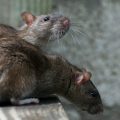
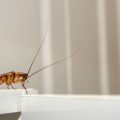


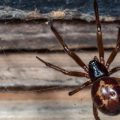
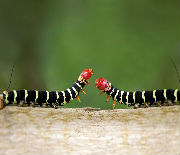
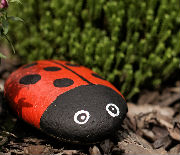
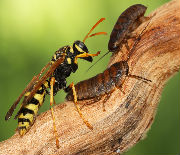
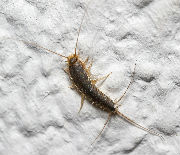
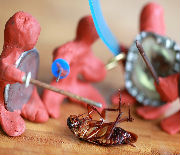
I found that applying a layer of cayenne pepper covered with a layer of sprayed-on cooking oil helps keep all three furry friends away, rats, mice and squirrels. The birds don’t have saliva in their mouth so the hot sauce doesn’t bother them at all.
Rats are not “nasty”. You may not want them in your garden, but they are amazing kittle creatures who are just trying to survive like everyone else.
I agree! I wouldn’t want them in the house but they are just trying to live like all living creatures…..including humans.
I totally agree with you .
One rat , I could live with in the garden but not loads of them .
Rats are living creatures. I am suffering negative consequences of not getting right place for feeders. It didn’t occure to me that rats are such good climbers. Unfortunately they are destroying some of my flower gardens that with feeding birds is what brings me joy and this brings on deppression without it.
I have no problem with batchelor rats. It’s when they go courting that the problem erupts. Unfortunately they breed like rats.
I will try Marilyn Eccles suggestion of cayenne pepper with sprayed on cooking oil to see if that deters our long tailed friends.
Malvin brown